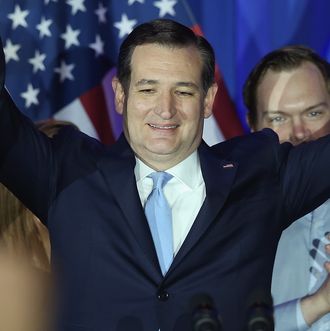
Ted Cruz and Bernie Sanders were often matched in previews of the Wisconsin primaries as candidates looking for big wins to help them in their chase of the front-runners, and it looks like both will win by similar low-to-mid-teens margins. Like Sanders, Cruz outperformed his polling averages. But the persistent difference between the two parties’ delegate-allocation rules shows why this is a bigger win for the Republican than for the Democrat: The GOP’s winner-take-all-by-statewide-and-CD-winner system in Wisconsin means Cruz will win somewhere between 36 and all of the 42 delegates the state awards. That’s a tangible if not necessarily decisive blow to Donald Trump’s odds of winning 1,237 delegates (or a number close enough to become its functional equivalent) by the time Republicans convene in Cleveland.
Moreover, Cruz, unlike Bernie Sanders, knocked down multiple perceived barriers to his own odds of displaying broad enough support to become a plausible nominee. In a three-way race, he won close to a majority of the vote in Wisconsin, aided by John Kasich’s significant underperformance (he was above 20 percent in several Wisconsin polls, but was bumping around 15 percent tonight in the actual vote, with a win in Dane County — Madison — being his only consolation prize). Cruz also, according to CNN’s exit polls, won among non-Evangelicals, older voters, non-college-educated voters, and even (very narrowly) among self-identified independents — all categories in which Trump has normally trounced him. He also won big among voters with a postgraduate degree, which has been a Kasich stronghold.
The big question in the Republican race going forward is whether Cruz can extend this broadening of his base of support into Donald Trump’s Northeastern stomping grounds, beginning with New York in two weeks. The crucial thing to understand about New York is that a majority of the vote, either statewide or in any given congressional district, wins all the marbles. The latest RealClearPolitics polling average for the Empire State has Trump at 53 percent. On the positive side for Cruz, New York is a closed-primary state where Trump won’t get a boost from independents unless they re-register as Republicans. Plus, a revived and perhaps last-chance Kasich effort could help keep Trump below the majority thresholds for delegate sweeps.
If you subscribe to the theory that Trump’s gaffes and crude insults to candidates and voters alike are finally catching up with him, Wisconsin looks like a bit of a breakthrough, particularly as interpreted alongside a dip in his national-poll ratings and some terrible general-election trial heats. But the estimated 58 percent of delegates he needs to win the nomination remains feasible if he wins big in the Northeast and remains sufficiently competitive in California to win some rotten-borough congressional districts mainly populated by minority folk who are feared and resented by their few Republican neighbors. But Cruz did his part in Wisconsin to keep hope alive for a contested convention. Add in the anecdotal evidence of Cruz stealing delegates from the Donald here and there as actual names are named, and it could continue to be a cliffhanger.






























